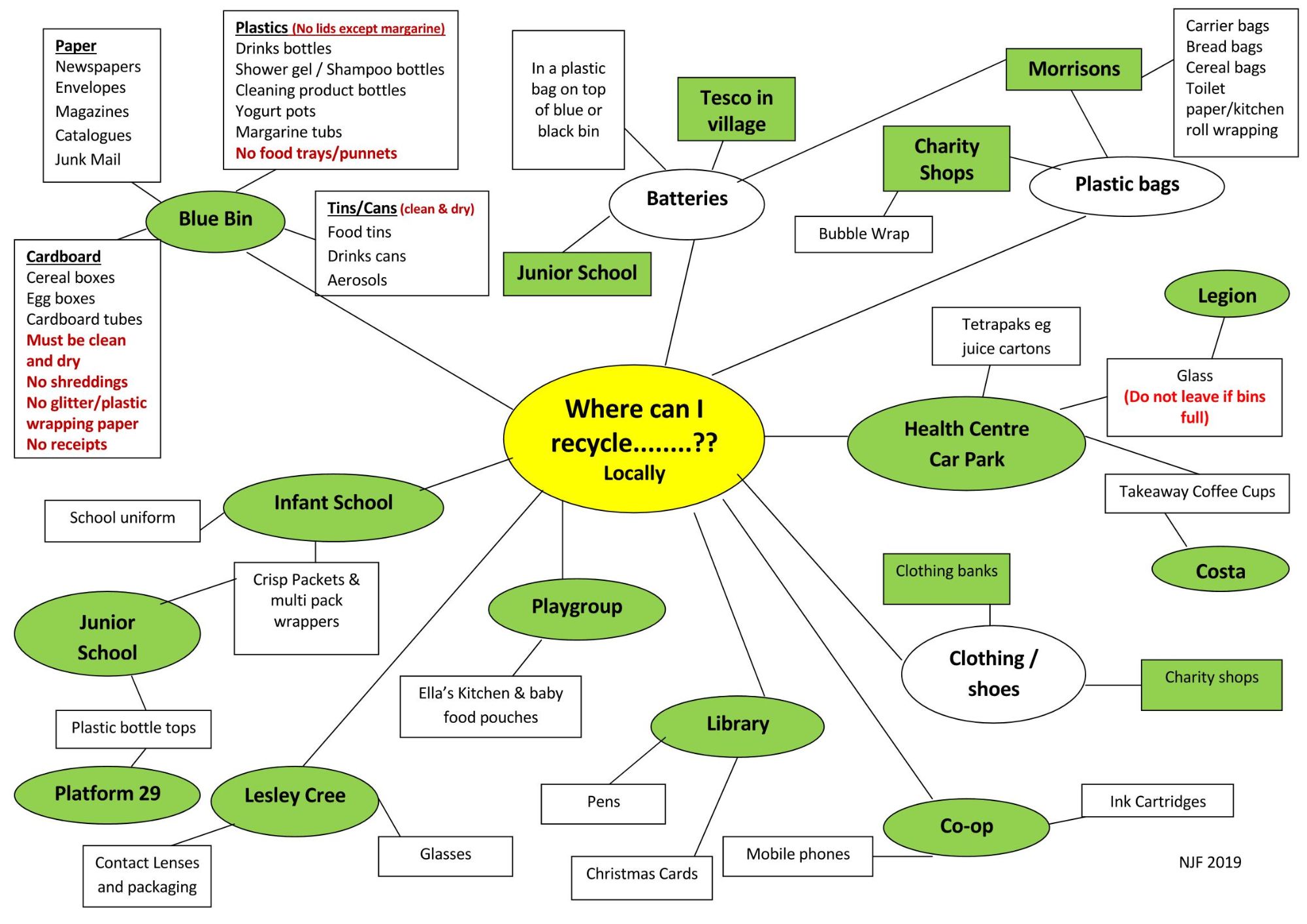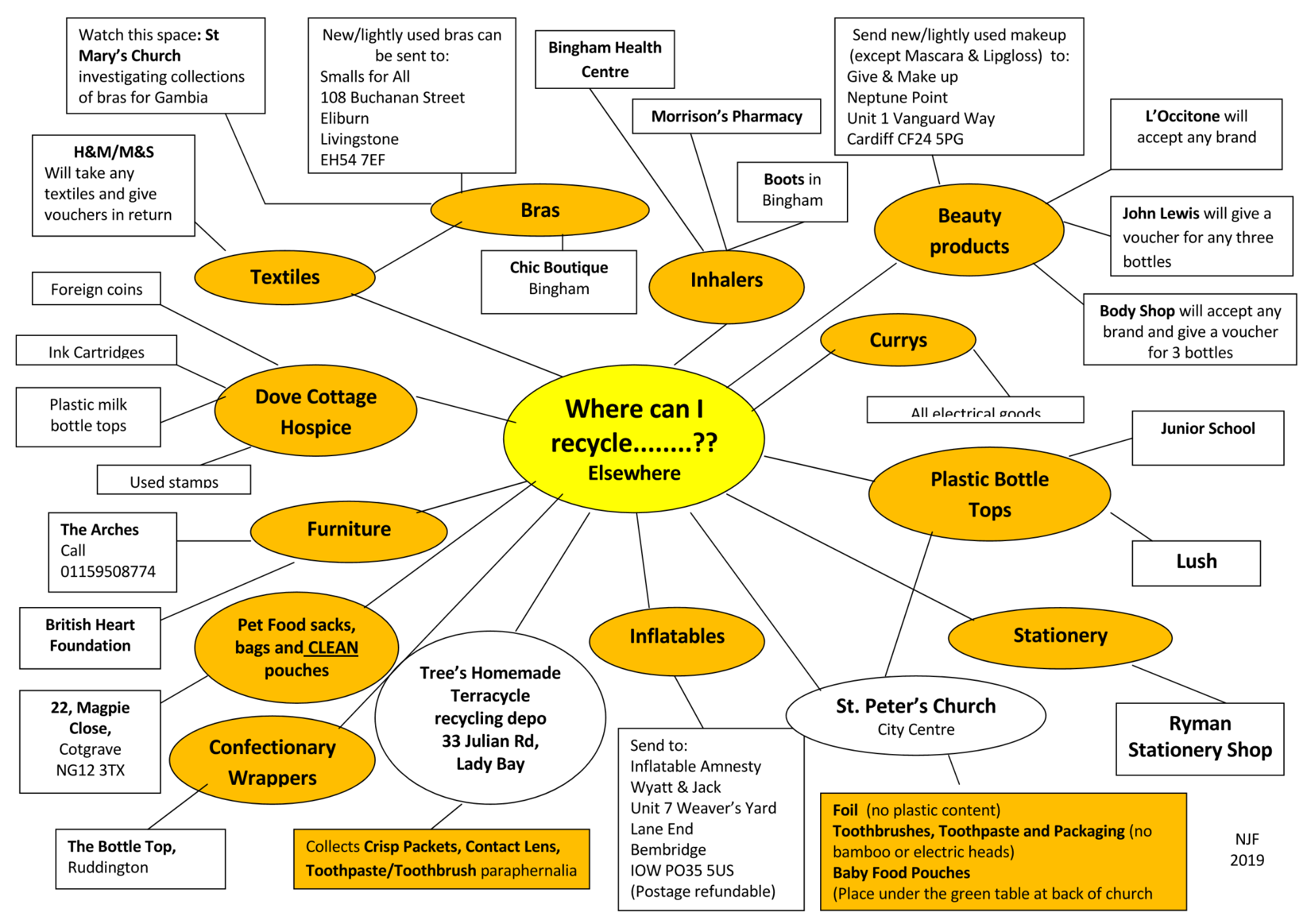about Reduce, reuse and recycle in lady bay
A Summary of our pages on Reduce, Reuse & Recycle
These pages have been set up to promote local initiatives to reduce waste and to encourage reuse and, failing that, recycling. Our first focus is on Reduce and Reuse.
Reducing and recycling our waste is a confusing business but all is not lost. Plastic-Free Lady Bay has been launched to promote the reduction and elimination of plastic waste and several pledges have already been made. In addition, Lady Bay people have set up a network of drop-off points for selected recyclable items and, in doing so, are also finding ways of reducing our waste. In particular, our page on 'Recycling & Alternatives by Item' contains a number of suggestions to encourage reuse instead.
This is a journey - we actively welcome contributions to improve the factual content of these pages and volunteers to act as drop-off points and/or centres of knowledge. If you want to jump straight in, without reading further, here are the main links on our website, in order of importance.
- Reducing waste and re-using - click here for our most recent contribution, based on 'Plastic-Free LadyBay'.
- Recycling - to find out more about our local drop-off centres, click here.
- To help you through the gaps and confusion around recycling, try consulting the very useful Rushcliffe Council’s A-Z of waste, learn what does and doesn't go in the blue and green bin and what you can take to the various recycling centres.
Then there are very helpful national sites, like these, each of which adds to our knowledge:-
https://www.which.co.uk/.../article/how-to-recycle-in-the-uk (very good on the 'why' some things aren't that simple to recycle but not always accurate advice compared to our local recycling capability)
https://www.recyclenow.com/recycling-knowledge (sponsored by the UK government but with ability for local searches by item)
http://www.recycling-guide.org.uk (not yet sure who this organisation is)
https://www.lovefoodhatewaste.com/
finally, here's a link to the pilot scheme to create channels across the footpath to allow EV charging for people without off-road parking - https://www.nottinghamshire.gov.uk/transport/travel-notts/electric-vehicle-charging-in-and-around-nottinghamshire/electric-vehicle-cable-channel-evcc-pilot-programme.
but after all that, the big messages are :-
there's a lot left over and there's a lot of regional variation!
This section has more explanation of the reasons for these pages - covering the 'why' as well as the 'what'.
Plenty of scope then - for confusion, yes, but also for doing something about it. By February 2020 the public collection of pens for recycling totalled 7.125kg, of which 4.274kg was collected by the fantastic pupils and staff at Lady Bay Primary School. Tree's Homemade Terracycle Recycling Depot in Julian Road has, so far, collected 45kg crisp packets, 8.2kg single-use contact lenses & packaging and 12kg of toothpaste 'stuff'.
So, although we can’t solve all the environmental problems on our own, we can take small steps in the right direction, especially with an active community like ours. "The man who removes a mountain begins by carrying away small stones" - Ancient Chinese proverb (apparently).
It obviously helps to understand more about what is and isn't recyclable and what impact each item has. It's a complicated subject; we start to learn about up and downcycling vs. recycling*, we come across materials that say they're recyclable but they ain't really (because local councils haven't been able to invest in the required equipment to handle everything). Also our day-today activity regularly presents us with 'stuff' that we can't remember - CAN we recycle this yoghurt pot? (answer - not if it's part of a multi-pack).
We hope that these pages will act as a gateway to the knowledge that is out there somewhere. Right now we don't have too much material for a knowledgebase but it is growing. Also the government-sponsored Recycle Now have put together a lot of information here - https://www.recyclenow.com/recycling-knowledge. However we still need local knowledge and activity.
If we are to take this seriously, we have to accept that our priorities should be:-
- Reduce waste and consumption
- Reuse materials
- Recycle - yes, only 3. Recycling still takes energy and the products involved are often very carbon intensive
Reduce - One such step is to try to avoid buying stuff that can’t be reused or recycled (some would say 'just stop buying stuff!'). We hope to build up a series of short ideas on this theme as these pages develop and we can point to a few local sources already trying to help us do this (see bottom of Drop-off Points page).
Reuse - The sad reality is that reuse was much more commonplace in the 50's than it is now. Part of our challenge is to try to reuse things once empty or worn out and to choose suppliers that support this. Again we hope to build up some ideas and present them here. Some ideas can also be found as part of the recycling by item page.
Recycle - As for the rest, we try to recycle and, for at least some of those hard-to-recycle items, we are developing a solution in Lady Bay and neighbouring areas. There are organisations that will accept certain items for recycling. So far we know of Terracycle, who are a business but do support fund-raising and Ellie's Fund , who raise funds for Brain Tumour Research and Support. However these organisations usually have to insist on a minimum quantity before they'll accept them. Individually we wouldn't generate that volume fast enough but, by setting up and using drop-off sites around Lady Bay, we can collect much more, much faster.
Volunteers in Lady Bay and nearby have set up local drop-off points for specific types of item and we also list nearby organisations that accept used materials. Because we are helpful we also have a parallel page organised by specific types of item, so you can search for anything you are interested in. Tips and suggestions on reduce and reuse are sprinkled among the items listed. Drop-off points also covers other local recycling sites or options.
Both volunteers and corrections of factual inaccuracies are equally welcome.
So if you've read this far, we hope you are interested in contributing. If so, please now return to the main Reduce, Reuse and Recycle page for links to the relevant information.
* Recycling means breaking something back down to its constituent parts so that they can be reused to make the same thing again, saving raw materials. Downcycling means that the materials are turned into something of lower value, that can be used but means that the replacement item needs fresh raw materials to make. So, for example, each tetrapak carton is made from fresh new materials, not recycled material from old ones. Upcycling means the output is of higher value than the original, although how 'value' is defined isn't so clear. We did say it was complicated.
It can be done!
Radcliffe on Trent have had a good go at the problem, we can do the same

